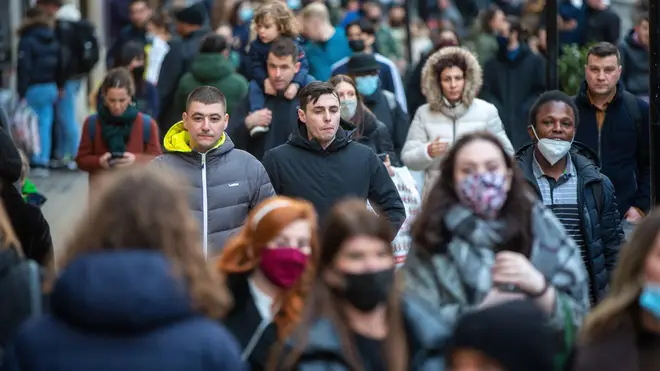
Ben Kentish 10pm - 1am
3 January 2022, 20:32 | Updated: 3 January 2022, 21:21

The rapid spread of the Omicron coronavirus variant could pave the way to normal life in just two months, a leading health expert has said.
Tyra Grove Krause, the chief epidemiologist at Denmark's State Serum Institute, said the new strain could ultimately help in the global battle against Covid-19.
She told Danish broadcaster TV2 there will be a huge number of cases over the next month.
READ MORE: Pupils to be tested on-site for Covid as they're asked to wear face masks in class
READ MORE: Bin collections cancelled as councils hit by Covid staff absences
She said: "Omicron will peak at the end of January, and in February we will see declining infection pressure and a decreasing pressure on the health care system.
"But we have to make an effort in January, because it will be hard to get through."
But she added that after two months, "I hope the infection will start to subside and we get our normal lives back".
She said a new study showed there is half of the risk of hospitalisation with Omicron compared to Delta.

British schools 'in a terrible position' as new term gets underway
Because the variant is milder and many people will be infected, it will provide a good level of immunity in populations.
"When it's over, we're in a better place than we were before," she added.
The UK Health Security Agency (UKHSA) last month said a major new analysis showed people with Omicron are between 50 and 70% less likely to need hospital care.
It comes as Boris Johnson warned pressure on the NHS is going to be "considerable" in the coming weeks.

WHO spokesperson says Covid will become 'endemic' in 2022
But there is no indication there will be any new restrictions, with the PM on Monday asking people to stick to Plan B measures while describing Omicron as "plainly milder".
Despite this, Matthew Taylor, chief executive of the NHS Confederation, has warned parts of the health service are in "crisis" due to high levels of demand and staff absences.
One NHS trust, United Lincolnshire Hospitals, has declared a "critical incident" with "extreme and unprecedented" staff shortages resulting in "compromised care".
The Government said 157,758 more Covid-19 cases were recorded in England and Scotland on Monday, while a further 42 people have died in England within 28 days of testing positive.